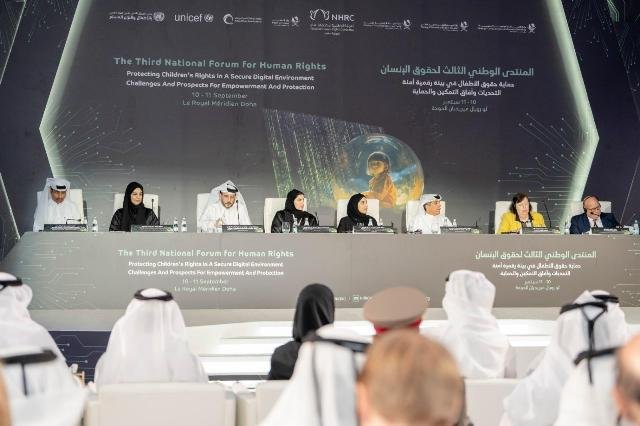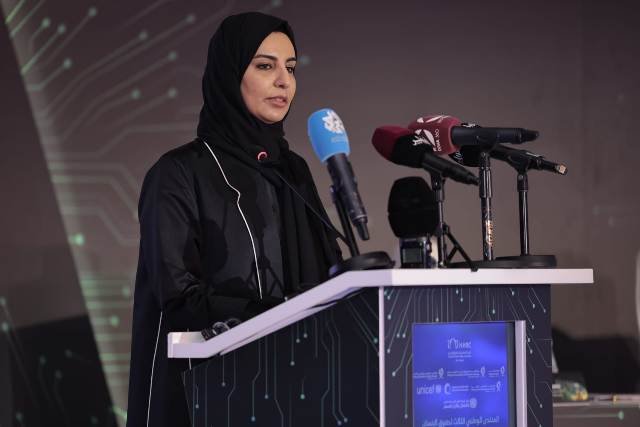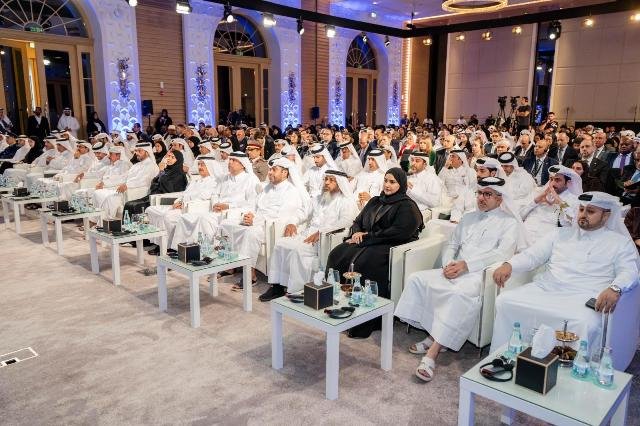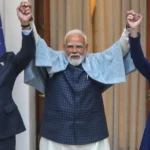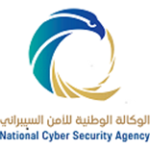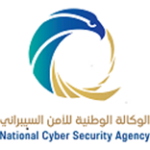Doha, 10 Sept. 2024 (QNA)
2-Day third edition of National Human Rights Forum took off today at the Hotel Le Royal Meridien Lusail emphasizing the importance of the efforts made by the State of Qatar through laws, legislation, policies, and technical measures to protect children in the digital environment.
Present on the occasion were Maryam bint Ali bin Nasser AlMisned, Minister of Social Development and Family; Engineer Abdulrahman bin Ali AlFarahid AlMalki, President of the National Cyber Security Agency; Dr. Ibrahim bin Saleh AlNaimi, Under Secretary Ministry of Education and Higher Education; Maryam bint Abdullah Al Attiya, Chairperson, National Human Rights Committee of Qatar; Reem Mohammed AlMansoori, Assistant Under Secretary, Digital Society Development, Ministry of Communications and Information Technology (MCIT); Col. Ali Hassan Ali AlKubaisi, Director, Economic and Cyber Crimes Combating Department, Ministry of Interior; Virginia Gamba, Special Representative of the Secretary-General for Children and Armed Conflict, United Nations; and Anthony MacDonald, Head of UNICEF Office, Qatar.
Among speakers on the first day of the forum also included Dr. Mohammed bin Saif Al Kuwari, Vice President of the National Human Rights Committee; Dr. Hind Ali Hamad Al Muraikhi, a senior researcher at the Qatar Computing Research Institute at Hamad Bin Khalifa University; Noor Ahmed Al Ishaq, legal researcher at the National Office for Personal Data Protection at the National Cybersecurity Agency; Hamad Mohammed Al Dosari, Assistant Public Prosecutor, Dr. Khaled Al Ansari, Head of the Pediatric Emergency Department at Sidra Medicine and Head of the National Team for Child Protection from Violence and Neglect at the Ministry of Public Health.
The speakers highlighted the significant role of families in monitoring and protecting their children. The forum featured several sessions on its first day. The first session focused on policies, programs, and technical measures to empower and protect children in the digital world. This session was moderated by Dr. Mohammed bin Saif Al Kuwari, Vice President of the National Human Rights Committee, and included five papers.
The participants in this session explained that the primary protection for children in the digital space starts with the family, which is responsible for monitoring their children. They noted that achieving this by the family would protect children by 80%, with the remaining protection depending on other efforts.
They also referred to the legislation, laws, policies, and measures prepared by the State of Qatar to protect children in the digital space, emphasizing that the family remains the key point for monitoring and following up on children at home.
The participants recommended the integration of the digital environment into the section dedicated to children's rights in the National Human Rights Committees annual reports.
They also suggested including children's rights in the digital environment in the guidelines prepared by the committee for educational institutions at various levels primary, preparatory, and secondary. Additionally, they called for stringent standards to ensure companies respect children's privacy in the electronic products and services they offer, and for providing necessary guidance to children on recognizing and avoiding digital threats.
They advocated for the issuance of a specific law on artificial intelligence to ensure the safety of its applications and the legitimacy of its objectives, particularly concerning the best interests of the children.
They proposed preparing a code of conduct with guidelines on digital content regulation based on human rights principles, including the best interests of the children, privacy, and the cultural identity of the Qatari society.
In the second session of the forum, Dr. Hind Ali Hamad Al Muraikhi, senior researcher at the Qatar Computing Research Institute at Hamad Bin Khalifa University, presented a paper on Qatar's national AI strategy and its role in digital empowerment of children.
She explained that the strategy established the foundations for building AI in the country and focuses on children, as they frequently interact with AI through educational programs or electronic games.
Dr. Al Muraikhi mentioned that Qatar launched its AI strategy in 2019, developed in collaboration with the Qatar Computing Research Institute, with the goal of making Qatar a global leader in this field. The strategy includes six pillars: education to inform individuals, access to data, ensuring job development, supporting businesses, focusing on research, and ensuring ethics in AI program development to protect user data.
She also discussed the challenges children face due to their use of AI, including privacy and security concerns. She highlighted fears regarding the privacy of childrens data and the security risks associated with storing and processing this data without their knowledge.
She recommended addressing the gap in AI education to ensure that all target groups are fully aware of how to use AI correctly. She also emphasized the need to design AI programs ethically and to support learning through AI by creating educational experiences that make children effective users of these programs.
Noor Ahmed Al Ishaq, legal researcher at the National Office for Personal Data Protection at the National Cybersecurity Agency, presented a paper titled on policies, standards, and guidelines for protecting children in the digital environment.
She confirmed that modern technologies have both positive and negative aspects. Among the negatives is the violation of digital space users' rights, with children constituting about a third of digital space users according to a 2017 OIC report.
Al Ishaq discussed the measures and mechanisms adopted in Qatar to protect children's rights against digital threats. These measures include the establishment of the National Office for Personal Data Protection, which oversees the implementation of the law, issues and develops initiatives, policies, and tools for legal compliance, and raises awareness while representing Qatar in international forums on personal data protection.
She stressed the need for coordination and cooperation with child rights organizations to achieve the goal of protecting children's right to privacy.
Hamad Mohammed Al Dosari, Assistant Public Prosecutor, addressed the issue of protecting children who are victims of cybercrimes. He noted that while information technology has seen tremendous development, it has also revealed serious negatives such as the exploitation of children online.
He pointed out that criminals use various methods, such as sending gifts and enticing children through social networks, which requires enhancing family awareness and protective measures.
Al Dosari also reviewed Qatari legislation aimed at combating child exploitation, highlighting legal measures that criminalize these acts and impose strict penalties on offenders. He emphasized the importance of educating families about digital space dangers and implementing effective precautionary measures to protect children, such as monitoring their online activities and activating security features on devices.
Dr. Khaled Al Ansari, Head of Pediatric Emergency Department at Sidra Medicine and Head of the National Team for Child Protection from Violence and Neglect at the Ministry of Public Health, in his paper on psychological support for children who are victims of abuse and digital violence, stated that internet use has increased since 2021. Despite its benefits, it exposes children to widespread risks.
He mentioned that the American Academy of Pediatrics recommends avoiding screen use for children from birth to 18 months, selecting high-quality programs under parental supervision, and setting limits on screen time.
Dr. Al Ansari emphasized the importance of raising children's awareness of new risks, suggesting enhanced regulatory systems, parental training, and the development of monitoring and support mechanisms to ensure children's safety in the digital environment.
He recommended maintaining cultural and religious identity during global events like Safer Internet Day, using celebrities to promote digital safety culture, and organizing training courses for parents on blocking inappropriate content. He proposed establishing a committee to handle complaints and issues related to customs and traditions and developing mechanisms to monitor digital content in collaboration with the Ministry of Economy.

